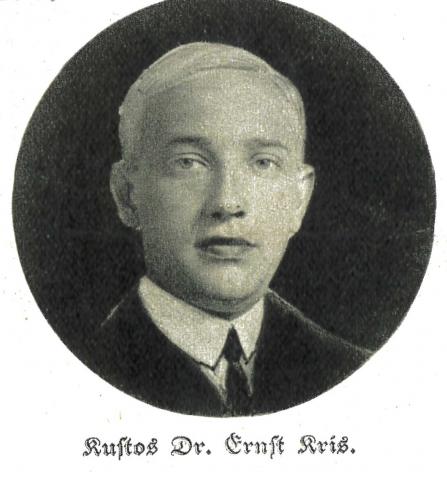The Viennese art historian Ernst Kris worked as researcher from 1927 to 1938 in the Collection of Sculpture, Arts and Crafts in the Kunsthistorisches Museum in Vienna. In 1927 he married the psychiatrist Marianne Rie, whose father was a paediatrician and a friend of Sigmund Freud. Apart from his research, Kris was also interested in psychoanalysis, and with his wife was a member of the Vienna Psychoanalytic Society. In 1933 he became co-editor of Imago, the magazine founded by Freud. To escape Nazi persecution on account of his Jewish origins, Kris applied for retirement in March 1938 and permission to emigrate to Britain. Museum director Fritz Dworschak supported his desire to emigrate by pointing to his loyal behaviour, having demonstrated "his attitude through the transfer of a number of valuable books, magazines and photographs for the relevant collection in our institution." A short time afterwards, Ernst and Marianne Kris and their two children were able to emigrate to London, where Kris analysed Nazi propaganda for the BBC. In 1940 the family moved to Canada. In September of that year he was employed as a professor at the New School for Social Research in New York. He now devoted himself entirely to his second career as a psychoanalyst and published a definitive work on caricature together with the art historian Ernst Gombrich. He also wrote about laughter, morality and totalitarianism, and the mechanisms and dangers of propaganda. In 1947, by now a US citizen, he attempted to obtain pension payments from Austria. His application was refused and it was not until March 1957 that the Federal Ministry of Education granted him a special pension. Unfortunately, it arrived too late, because Ernst Kris had died a few days earlier.
In the course of provenance research at the KHM, 61 books from the previous property of Ernst Kris were identified in the library. On 29 June 2021, the Art Restitution Advisory Board recommended the restitution of these works to the legal successors.

